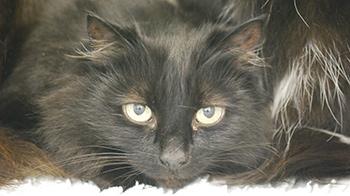Grooming your cat
From choosing the best brush for your cat to helping them learn to enjoy grooming sessions with you, here's everything you need to know about grooming your cat.
Should you groom your cat?
In a word, yes! Regular grooming allows you to spend quality time with your cat, as well as providing the opportunity to monitor their health. Grooming also removes dust, dead skin and loose hairs, prevents serious tangling and matting and can improve circulation.
Looking at the condition of your cat's coat can be a good way of checking on their overall health and nutrition. Look for issues such as sore patches, wounds or matted fur, and if the condition of your cat's coat changes, visit your vet for a check-up.
How much time to spend grooming your cat
This depends on your cat, but short, regular sessions are best. Use praise and treats to help your cat associate grooming with nice things. Some cats find grooming uncomfortable, so if you notice your cat twitching, swishing their tail, growling or hissing, end the session.
Many long-haired cats need grooming every day to prevent knots from forming, while short-haired cats generally do a good job of grooming themselves. However, grooming sessions at least once a week are still important to help keep their coat in a good condition.
Grooming a long-haired cat
Use a wide-toothed metal comb and follow the direction the hair grows in naturally. Include your cat's chest and abdomen, behind their ears, the backs of their legs and armpit area, where tangles tend to form.
Tease any knots gently with the comb to avoid damaging the skin. Keep grooming sessions short, especially while your cat gets used to them, and finish with praise and a reward.
Choosing the best grooming comb or brush for your cat
There are a variety of combs and brushes available. Some are specifically for checking for fleas and eggs, while others help tackle the moulting season. Others include:
- Specialised dematting combs, which should be used instead of attempting to cut matted fur with scissors, as there is the risk of cutting your cat's skin.
- Soft bristle and pin brushes, which can help distribute natural oils which can help the condition of your cat's fur.
- Slicker brushes, which are good for pulling out dead hair and breaking down mats in long-haired cats.
You can also buy grooming mitts, which are useful for removing the dead hair from shorter-coated breeds.
Get more animal welfare advice
Sign up to receive our emails today. Get more pet care advice, hints and tips on helping wildlife, our latest news, rehoming success stories and more directly to your inbox.

